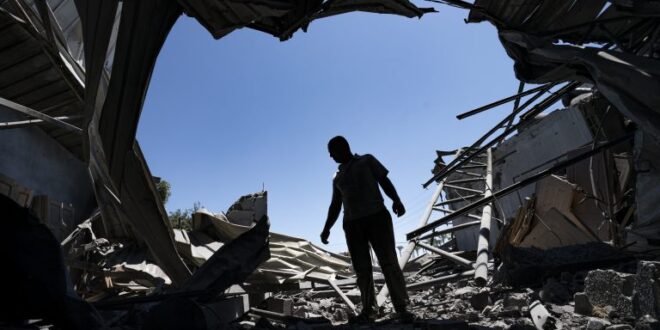The strategic weaknesses of several Arab states were exposed by the recent fighting between Israel and the Palestinians.
Arab states were unable to prevent the conflict or contain further escalation, despite supposed leverage from recent agreements with Israel.
Qatari diplomacy reportedly played a significant role in bringing about the cease-fire, validating Doha’s strategy of keeping diplomatic channels open throughout the conflict.
The decision by some Arab states to normalize relations with Israel was tarnished by the fighting and resultant losses of life.
The recent eleven-day conflict in May between Israel and the Palestinians exposed weaknesses in the regional strategy of key Arab states. The conflict was initially sparked by protests tied to evictions of Palestinian families in East Jerusalem and a heavy-handed law enforcement response; upon the escalation of violence, Israeli forces largely intended to target militant Palestinian factions led by Hamas and Palestine Islamic Jihad (PIJ) in their campaign in Gaza. Longstanding efforts by Egypt, Saudi Arabia, and the United Arab Emirates (UAE) to constrain Hamas and its Muslim Brotherhood-inspired Islamist ideology were set back by Hamas resilience in the fighting with Israel. All three countries have sought to repress domestic Muslim Brotherhood-linked movements and undermine their regional affiliates, viewing the Brotherhood as a threat to established Arab regimes and to regional stability. Yet, the three states have so far failed to reduce Hamas’ grip on the Gaza Strip or weakened its resolve to resist a peace agreement with Israel. Hamas has emerged from the latest round of fighting with perhaps more popularity among Palestinians and other Arabs than at any time since its founding.
Egyptian and broader Arab strategy has also failed to sever the patron-client relationship between Iran and the Palestinian factions in the Gaza Strip. Egypt, long at peace with Israel and ruled by leadership that displaced an elected Muslim Brotherhood-affiliated president in 2013, has sought to use its control of the Gaza border to block Iranian arms shipments to the two militant groups. That effort might have complicated Iranian efforts to ship assembled, upgraded rockets to the groups. Hamas and, to a lesser extent, PIJ, were, however, able to adapt Iranian technology to manufacture the systems in Gaza itself. By the time the May conflict broke out, Hamas and PIJ had amassed an arsenal of over 30,000 rockets, some of which are capable of hitting northern Israel. In the aftermath of protests of planned evictions of Palestinian families in East Jerusalem and an Israeli police raid at the al-Aqsa Mosque during Ramadan, Hamas and PIJ launched barrages of these rockets at Israeli cities. The eleven-day conflict saw Israel targeting Hamas leaders, while devastating Gaza’s infrastructure in the process. Several mosques, nearly twenty hospitals and health clinics, and over a dozen schools were destroyed in Gaza, which also suffered a disruption to water, sewer, and electricity services. Some of Hamas’ over 4,300 rockets launched toward Israel penetrated its sophisticated Iron Dome interceptor system (approximately 15%). Conversely, Israel’s airstrikes displaced more than 77,000 civilians in the densely populated Gaza Strip, home to about 1.9 million people. With help from Biden administration pressure on Israeli Prime Minister Binyamin Netanyahu, Egypt brokered the May 20 ceasefire, but decades of Egyptian diplomacy, including more recent diplomacy with Hamas, have not resulted in progress on a peace settlement between Israel and the Palestinians.
The Israel-Gaza conflict has also tarnished a key element of UAE strategy – establishing open ties with Israel. The UAE sought, and received, modest concessions from Netanyahu in exchange for signing the U.S.-brokered “Abraham Accords”in September 2020, but the May Gaza-Israel conflict, which resulted in more than 230 Palestinian casualties and 12 Israeli casualties, illustrates that those Israeli concessions were mostly cosmetic. The majority of casualties on both sides during the conflict were civilians. Contrary to UAE leadership calculations, and those of many regional leaders, the May conflict demonstrated that the Palestinian issue remains front and center; it also indicated that Arab leaders perceived as abandoning the Palestinians in favor of Israel might pay a heavy political price. None of the four countries that signed onto the Abraham Accords – UAE, Bahrain, Sudan, and Morocco – have yet abrogated their commitments under the agreement as a result of the recent fighting. However, the recent conflict is likely to cause other Arab states, such as Oman or Saudi Arabia, to think twice before joining the Abraham Accords.
Reporting suggests that Qatari diplomacy played a key role in bringing about the cease-fire, validating Doha’s strategy of keeping diplomatic channels open throughout the conflict. Qatar has ruled out normalizing relations with Israel until there is a permanent Israeli-Palestinian settlement, but the wealthy emirate has worked tacitly with Israel to provide hundreds of millions of dollars in development and humanitarian aid to Gaza. Qatar and Israel had judged that the funding would be a deterrent for Hamas and other militant organizations to engage in another major conflict with Israel. After all, Qatari aid and diplomacy had prevented or calmed clashes at the Israel-Gaza border in recent years. But in the most recent fighting, both Hamas and PIJ calculated that military escalation, given events in Jerusalem, would serve both their strategic and political interests. To bolster the durability of the cease-fire between the Israelis and Palestinians, U.S. Secretary of State Antony Blinken will travel to the Middle East this week, where he will also work to garner support for humanitarian aid for Gaza. The ceasefire might endure, but the fighting is likely to cause key Arab states to re-examine the strategic assumptions and policies that failed to prevent the warfare, mitigate the toll on civilians, or forge a unified Palestinian front that can pursue a final settlement with Israel. Finally, Israel’s weak coalition government will be challenged in making progress, with prospects of a longer-term solution just as evasive as ever, it seems.
 Eurasia Press & News
Eurasia Press & News




